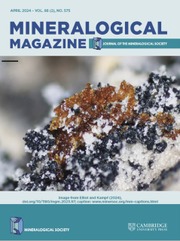Article contents
The complex mechanism of Ti4+ incorporation into litidionite from the Somma–Vesuvius volcano, Italy
Published online by Cambridge University Press: 16 February 2022
Abstract
For this study, the rare Cu-bearing silicate fumarolic assemblages from the Somma–Vesuvius volcano, Italy, characterised by the rare mineral litidionite, CuKNaSi4O10, were investigated. We report new data about Cu- and Ti-bearing phases found in these mineralisations, in which Ti-bearing litidionite occurs together with kamenevite, perovskite and rutile. Ti-bearing litidionite appears on the latest stages of partial crystallisation of Ti-bearing silica glass. Incorporation of Ti4+ into the litidionite crystal structure was investigated in detail. The Raman spectra of Ti-bearing litidionite contains an intense band at 597 cm−1 related to anti-symmetric bending vibrations of Si‒O bonds or overlapping stretching vibrations of Ti‒O bonds. The bands in the range 350‒500 cm−1 correspond to symmetric bending vibrations of O‒Si‒O bonds and overlapping stretching vibrations of Ti‒O bonds. The crystal structure of Ti-litidionite has been refined in the P$\bar{1}$ space group, a = 6.9699(7), b = 7.9953(10), c = 9.8227(10) Å, α = 105.186(9), β = 99.458(8) and γ = 114.489(10) to R1 = 0.064 for 1726 unique observed reflections. The refinement of the site-occupation factors confirmed the presence of Ti at a five-coordinated M site. The mean bond distance of 2.125 Å for the M site agrees with its refined occupancy (Ti0.32Cu0.30Ca0.29Fe0.09)1.00. The incorporation of Ti into the litidionite structure is accompanied by the complex heteropolyhedral substitution according to the scheme VTi4+ + VII–VIII□ + IVAl3+ ↔ VCu2+ + VII-VIII(Na,K)+ + IVSi4+. Two possible configurations for the phase with maximal TiO2 content (12.06 wt.% or 0.56 Ti apfu) CuTiK□Na2Si7AlO20 (Z = 1) or CuTiK2Na□Si7AlO20 (Z = 1) have been proposed.
space group, a = 6.9699(7), b = 7.9953(10), c = 9.8227(10) Å, α = 105.186(9), β = 99.458(8) and γ = 114.489(10) to R1 = 0.064 for 1726 unique observed reflections. The refinement of the site-occupation factors confirmed the presence of Ti at a five-coordinated M site. The mean bond distance of 2.125 Å for the M site agrees with its refined occupancy (Ti0.32Cu0.30Ca0.29Fe0.09)1.00. The incorporation of Ti into the litidionite structure is accompanied by the complex heteropolyhedral substitution according to the scheme VTi4+ + VII–VIII□ + IVAl3+ ↔ VCu2+ + VII-VIII(Na,K)+ + IVSi4+. Two possible configurations for the phase with maximal TiO2 content (12.06 wt.% or 0.56 Ti apfu) CuTiK□Na2Si7AlO20 (Z = 1) or CuTiK2Na□Si7AlO20 (Z = 1) have been proposed.
- Type
- Article
- Information
- Copyright
- Copyright © The Author(s), 2022. Published by Cambridge University Press on behalf of The Mineralogical Society of Great Britain and Ireland
Footnotes
Associate Editor: G. Diego Gatta
References
- 1
- Cited by


